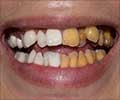As with many other things in life, whether or not children receive regular dental care is strongly associated with their parents' history of seeking dental care.
As with many other things in life, whether or not children receive regular dental care is strongly associated with their parents' history of seeking dental care.
A new report to appear in the journal Pediatrics, which has been released online, is the first to analyze the relationship between parents' and childrens' dental visits in a nationally represntative sample."When parents don't see the dentist, their children are much less likely to see the dentist," says Inyang Isong, MD, MPH, of the MassGeneral Hospital for Children (MGHfC) Center for Child and Adolescent Health Policy, the study's lead author. "We also found that the children of parents who have put off their own dental care for financial reasons are more likely to have their care deferred due to cost as well. It looks like strategies to promote oral health should focus on the whole family."
The study's authors note that dental caries – tooth decay – is of one of the most prevalent childhood diseases and is particularly common among minority and low-income children. Previous studies have associated factors including insurance coverage, parents' income and education, and the availability of dental care in the local community with the likelihood that children will have regular dental visits.
Earlier investigations of the impact of parents' accessing dental care focused on particular demographic groups. In order to see whether associations from those studies applied more broadly, the current investigation analyzed data from the 2007 National Health Interview Survey and its Child Health Supplement, which are designed to collect basic health and demographic information, along with answers to questions on health topics of current interest, from a cross section of the U.S. population.
Survey responses including data regarding dental visits for both a child and parent in the same household was available for around 6,100 matched pairs. Among parents who reported seeing a dentist during the preceding year, 86 percent of children had also seen a dentist; but only 64 percent of the children of parents with no recent dental visit had seen a dentist during the previous 12 months. In addition, among parents who put off their own dental care because of financial considerations, 27 percent of their children also had dental care deferred. In contrast, only 3 percent of children whose parents had not put off their own care care had their dental care deferred.
"Even when children are covered by medical insurance, it appears that financial barriers are influencing parents' decisions about accessing dental care for their children," says Isong, a clincal fellow at MGHfC. "We're now in the process of looking at the impact of dental insurance – something not addressed by the NHIS – and other enabling resources on the relationship between parents' and children's receipt of dental care."
Advertisement
Source-Eurekalert
RAS









